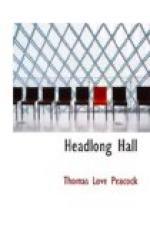[9.1] Me miserable! and thrice miserable! and four times, and five times, and twelve times, and ten thousand times miserable!
[9.2] Pronounced cooroo—the Welsh word for ale.
Chapter 10
[10.1] Long since dead.
[10.2] Georg. I. 199.
[10.3] Sat. XIII. 28.
[10.4] Carm. III. 6, 46.
Chapter 11
[11.1] Pistyll, in Welch, signifies a cataract, and Rhaidr a cascade.
[11.2] Rabelais.
Chapter 13
[13.1] Rousseau, Discours sur les Sciences.
[13.2] Imitated from a passage in the Purgatorio of Dante.
Chapter 14
[14.1] Jeremy Taylor.
Chapter 15
[15.1] It descends to the shades: or, in other words, it goes to the devil.
TRANSCRIPTION NOTES
Source
Form: printed book
Title: Headlong Hall
Author: Thomas Love Peacock
Publisher: J. M. Dent & Co. at Aldine House,
69 Great Eastern
St.,
London.
Date: 1891
Editor: Richard Garnett, LLD.
Printer: Turnbull and Spears, Printers,
Edinburgh.
British Library
Shelfmark: 012611.i.37/1
Description: tan cloth over board binding,
122mm x 184mm x 21mm,
176
pages plus 2 at front and 1 at back
Modifications
Chapter head and foot decorations have been deleted — to simplify production to purely text.
Decorative chapter-start drop-caps have been replaced with capitals — to simplify production to purely text.
Page numbers and headers have been deleted — the new document is unpaginated.
Fullstops have been deleted from chapter titles and song titles — they are superfluous.
All notes have been moved to the end of the document — to suit the unpaginated format.
All notes by the editor Richard Garnett have been deleted — to remove (insubstantial) attachments to the original text.
Chapter 1 paragraph 7: inserted closing quotes after “perpetually in statu quo.” — they appear to be missing, since the speech is not continued in the next paragraph.
Chapter 1 paragraph 8: deleted fullstop after “astronomy——” — the sentence is truncated, it does not end.
Chapter 1 paragraph 9: deleted fullstop after “selfishness——” — the sentence is truncated, it does not end.
Chapter 1 paragraph 10: deleted fullstop after “cloth——” — the sentence is truncated, it does not end.
Chapter 1 paragraph 11: inserted a comma after “sprained ankle” — there is a small comma-sized gap at the end of the line where a comma appears to have been omitted.




